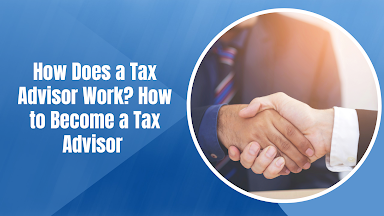How Does a Tax Advisor Work? How to Become a Tax Advisor
How Does a Tax Advisor Work? How to Become a Tax Advisor
Tax advisors, or "tax consultants," provide individuals and businesses with a variety of tax consulting services.
Professional tax advisors assist others in successfully navigating the tax laws and regulations that affect their finances in a variety of ways, including estimating past-due tax payments, preparing tax returns, and representing clients during audits.
Consider a careeras a tax advisor if you enjoy working with numbers and are good at solving problems.
You will learn more about tax advisors, what they do, and how much they make in this guide. You will also learn the steps you need to take to become a tax advisor and look into low-cost courses that can help you get skills that are useful in the workplace right now.
What is a tax consultant?
Tax advisors, or "tax consultants," assist individuals and businesses in navigating the complicated tax system. In order to reduce your clients' tax obligations, you will combine your expertise in accounting, auditing, and effective planning with your knowledge of tax law and finance.
You could work as a certified public accountant (CPA), a tax attorney, or an enrolled agent, among other positions, to provide tax advice.
How does an expense counselor respond?
Experts in taxation, tax advisors help others reduce their taxable income or maximize their tax refunds. By conducting audits and resolving tax issues with the Internal Revenue Service (IRS) or state tax authority, tax advisors effectively ensure that their clients do not pay more in taxes than they are required to based on their income level, investments, and other factors.
In most cases, they carry out the following duties:
- Conduct research on tax issues and ensure that clients comply with tax laws.
- Prepare and examine tax returns, as well as estimated taxes, franchise taxes, sales and use taxes, property taxes, and corporate and individual income taxes.
- Consult on tax-related matters.
- If you are a CPA, attorney, or enrolled agent, you can represent clients in front of the IRS. You can also look over proposed legislation that would affect clients' taxes.
The salary for tax advisors is well compensated for their expertise.
As per the US Department of Work Measurements (BLS), the middle yearly pay for bookkeepers and examiners was $77,250 a year as of May 2021 [1]. In contrast, as of January 2023, the average base salary for tax advisors is estimated by Glassdoor to be $62,734 [2].
But the exact amount you can expect to make as a tax advisor will likely depend on your employer, specialization, work experience, and location.
The primary steps you'll likely need to take to become a tax advisor are as follows, though the specifics will vary depending on your background and personal journey:
1. Take a look at a degree.
According to Zippia, although a college degree is not always required to become a tax advisor, approximately 54% of all tax advisors possess one. Associate, bachelor, or master's degrees in accounting, business, finance, or a related field are typical degrees for tax advisors. As you consider the way you'll take to turning into an expense counsel, this is the thing you can anticipate from every degree program:
An associate's degree You can learn how to analyze financial data and the specifics of business law and accounting regulations by enrolling in accounting or a related field of study-related associate degree program. Typically, these programs are finished in two years.
Degree: Bachelor's Most bosses searching for charge counselors favor candidates to have essentially a four-year certification. A bachelor's degree in accounting, business, finance, taxation, or business administration—or a related field—may be an option.
An advanced degree: Master's programs can prepare you for a specific tax specialization and expose you to more complex tax issues like international taxation
2. Learn the necessary skills.
You need to be well-versed in tax law, accounting, and math, as well as have excellent communication skills, in order to work as a tax advisor. As a result, in order to enter the profession, you should think about developing the following skills:
Numerical capacity: You'll use strong numerical reasoning skills as a tax advisor. To spot errors or issues, you must be able to analyze financial data.
Precision and attention to detail: Because mistakes can cost customers money, you'll need to pay close attention to the little things.
Skills for strategic thinking and problem-solving: You will be taking a gander at clients' monetary information and utilizing vital reasoning abilities to recognize ways for clients to set aside cash or increment benefits. You will solve problems for clients by applying your skills.
Skills in software and computers: You will need to be familiar with spreadsheets, databases, accounting and tax software, as well as other accounting-related software. QuickBooks, Peachtree, Sage 50, ProSeries, Drake Tax, ATX Tax, and Lacerte are examples of software utilized frequently in tax work.
Communicating orally: Expenses can be mind-boggling and tangled. When dealing with clients about sensitive financial matters, having good communication skills is essential. a commitment to continuing education: You must complete continuing education courses each year to remain registered and current.
Conclusion:
Inchub is a new and innovative online platform that provides a hub for entrepreneurs, startups, and investors to connect and collaborate. Whether you're an aspiring entrepreneur with a great idea, or an investor looking to find the next big thing, Inchub has something to offer.
For More Information,
Phone: +971-4-576-1654
Mail: mahesh@inchub.ae
Website: https://www.inchub.ae/




Comments
Post a Comment